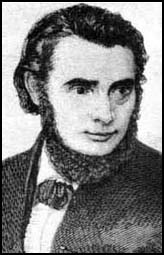- George Julian Harney
Infobox Person
name = George Julian Harney
image_size =
caption = George Julian Harney
birth_name =
birth_date = February 17, 1817
birth_place = flagicon|UKDeptford ,London
death_date = December 9, 1897
death_place = flagicon|UKEngland
death_cause =
resting_place =
resting_place_coordinates =
residence =
nationality =
other_names =
known_for =
education =
alma_mater =
employer =
occupation =
home_town =
title =
salary =
networth =
height =
weight =
term =
predecessor =
successor =
party =
boards =
religion =
spouse =
partner =
children =
parents =
relatives =
website =
footnotes =George Julian Harney (
17 February 1817 -9 December 1897 ) was a 19th century English political activist, journalist, andChartist leader. He was also associated withMarxism ,socialism , anduniversal suffrage .Early life
George Julian Harney, the son of a seaman, was born in
Deptford in south-eastLondon . When Harney was eleven he entered the Boy's Naval School atGreenwich . However, instead of pursuing a career in the navy he became a shop-boy forHenry Hetherington , the editor of the "Poor Man's Guardian ". Harney was imprisoned three times for selling this unstamped newspaper.This experience radicalised Harney and although he was initially a member of the
London Working Men's Association he became impatient with the organization’s failure to make much progress in the efforts to obtainuniversal suffrage . Harney was influenced by the more militant ideas ofWilliam Benbow ,James Bronterre O'Brien andFeargus O'Connor .In January 1837 Harney became one of the founders of the openly republican
East London Democratic Association . Soon afterwards Harney became convinced of William Benbow's theory that a Grand National Holiday (General Strike ) would result in an uprising and a change in the political system.Involvement with Chartist movement
At the
Chartist Convention held in the summer of 1839, Harney and William Benbow convinced the delegates to call a Grand National Holiday on12 August .Feargus O'Connor argued against the plan but was defeated. Harney and Benbow toured the country in an attempt to persuade workers to join the strike. When Harney and Benbow were both arrested and charged with making seditious speeches, the General Strike was called off. Harney was kept inWarwick Gaol but when he appeared at theBirmingham Assizes the Grand Jury refused to indict him ofsedition or any other count.Disappointed by the failure of the Grand National Holiday, Harney moved to
Ayrshire ,Scotland , where he married Mary Cameron. Harney's exile did not last long and the following year he became theChartist organizer inSheffield . During the strikes of 1842 Harney was one of the 58 Chartists arrested and tried at Lancaster in March 1843. After his conviction was reversed on appeal, Harney became a journalist forFeargus O'Connor 's "Northern Star". Two years later he became the editor of the newspaper.Association with Marx and Engels
Harney became interested in the international struggle for universal suffrage and helped establish the
Fraternal Democrats in September 1845. It was through this organisation that Harney metKarl Marx andFriedrich Engels . Harney persuaded both men to write articles for the "Northern Star". Excited by the Continental Revolutions of 1848, Harney traveled toParis in March, 1848 to meet members of the provisional government.According to his friend and fellow radical,
John Bedford Leno , Harney was::"more conversant with foreign politics than any man I ever knew, and the first inquiries made by foreign refugees on landing on our shores was to forward the discovery of his whereabouts."
Involvement with Socialism
Harney was now a
Socialist and he used the "Northern Star" to promote this philosophy.Feargus O'Connor disagreed withSocialism and he pressurized Harney into resigning as editor of the paper. Harney now formed his own newspaper, the "Red Republican ". With the help of his friend,Ernest Charles Jones , Harney attempted to use his paper to educate hisworking class readers aboutsocialism andproletarian internationalism . Harney also advocatedsocialism in thetrade union movement.In 1848 Harney stood as the
Chartist Candidate against Lord Palmerston for the seat of Tiverton inDevon , an event described byEngels in an article for "La Reforme" thus::"It will be recalled that at the last elections Mr. Harney, editor-in-chief of the "Northern Star", was put forward as the
Chartist candidate for Tiverton, a borough which is represented in Parliament byLord Palmerston , the Foreign Secretary. Mr. Harney, who won on the show of hands, decided to retire whenLord Palmerston demanded a poll" "In 1850 the "Red Republican" published the first English translation of "
The Communist Manifesto ". The "Red Republican" was not a financial success and was closed down in December 1850. Harney followed it with the "Friend of the People " (December 1850 - April 1852), "Star of Freedom " (April 1852 - December 1852) and "The Vanguard" (January 1853 - March 1853).After "The Vanguard" ceased publication Harney moved to Newcastle and worked for
Joseph Cowen 's newspaper, the "Northern Tribune " and after traveling to meet French socialists living in exile inJersey , Harney became editor of theJersey Independent . Harney's support for the North in theAmerican Civil War upsetJoseph Cowen and in November 1862 Harney was forced to resign.Emigration to United States and return to England
In May 1863 Harney immigrated to the
United States . For the next 14 years he worked as a clerk in theMassachusetts State House . After his retirement he returned to England where he wrote a weekly column for the "Newcastle Chronicle ". Harney died on9 December 1897 .References
* http://www.spartacus.schoolnet.co.uk/CHharney.htm
* The Aftermath with Autobiography of the Author (John Bedford Leno published By Reeves & Turner, London 1892)
Wikimedia Foundation. 2010.
